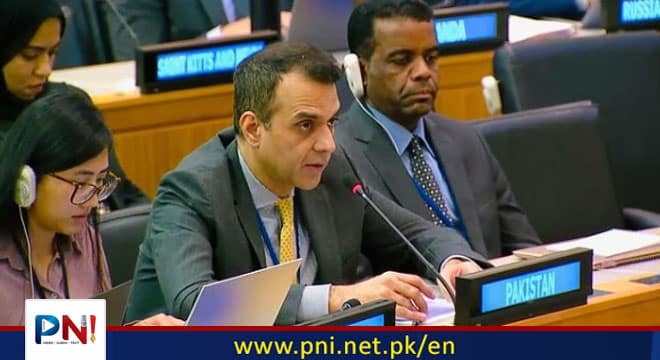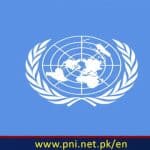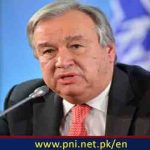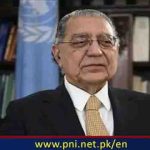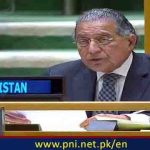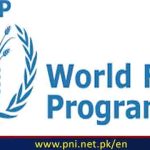UNITED NATIONS, Jan 10 (APP): Pakistan Tuesday warned that failure of international efforts to halt the “brutal” Israeli war on Gaza risked escalation that could engulf the entire region, as the UN General Assembly debated the use of the veto by the United States in the Security Council last month. “The Council has been paralyzed due to the resistance and negative vote of a permanent member,” Ambassador Usman Jadoon, acting permanent representative of Pakistan to the UN, told the 193-member Assembly — without naming the U.S.
“A heavy responsibility rests on those who have enabled the prolongation of this war and the continuing slaughter of innocent civilians in Gaza,” the Pakistani envoy pointed out. The veto is a special voting power held by the permanent members on the Council, whereby if any one of the five — China, France, Russia, the UK and the US — casts a negative vote, the resolution or decision automatically fails. Tuesday’s meeting was held under the Assembly’s standing mandate to convene within 10 working days of a veto being cast in the Council. On Dec. 22, the United States vetoed an amendment proposed by Russia that would have called for “an urgent suspension of hostilities to allow safe and unhindered humanitarian access’.
Subsequently, the 15-member Council adopted a watered-down resolution calling for speeding aid deliveries to desperate civilians in Gaza but without the original plea for an “urgent suspension of hostilities” between Israel and the Palestinian fighters. The vote was 13 in favour to none against, with 2 abstentions (United States, Russian Federation). In his remarks, the Pakistani envoy said that the Council has regrettably failed in fulfilling its obligation to impose a ceasefire. “Pakistan, therefore, reiterates its call for an immediate and unconditional ceasefire,” Ambassador Jadoon said, highlighting that Israel’s war in Gaza is brutal — a veritable genocide. “This latest exercise of the veto reinforces our conviction that the reform of the Security Council should not add more permanent members to its composition,” he said, referring to the push by India, Brazil, Germany and Japan for permanent seats in an expanded Security Council — a move Pakistan and its allies stoutly oppose.
“Israel’s indiscriminate slaughter of innocent Palestinian civilians, including children and women, is a flagrant violation of international law, including the principles of the UN Charter, international humanitarian and human rights law,” Jadoon said, adding that this genocidal war must be stopped forthwith in accordance with the General Assembly’s resounding call for an immediate and unconditional humanitarian ceasefire. “Pakistan strongly and unequivocally condemns Israel’s rejection of a humanitarian ceasefire,” he said. “Beyond the imperative of an immediate and sustainable ceasefire, we must ensure the provision of adequate humanitarian assistance to the besieged population of Gaza,” the Pakistani envoy said, upholding the peoples’ right to life and dignity. There must be consequences and accountability for Israel’s criminal actions in Palestine, the Pakistani envoy said. In this regard, he said Pakistan welcomed South Africa’s initiative to bring Israel’s transgressions under the Genocide Convention to the Hague-based International Court of Justice (ICJ). Pakistan, he added, also looks forward to the Advisory Opinion of the ICJ on the legal consequences arising from the policies and practices of Israel in the Occupied Palestinian Territory, including East Jerusalem. “The root cause of this crisis lies in Israel’s prolonged occupation and denial of Palestinians’ inalienable right to self-determination.
Israel’s brutal campaign against the occupied people of Palestine struggling for their freedom cannot be justified under the guise of self-defence,” Jadoon said. “The international community cannot accept the fait accompli Israel is seeking to impose to destroy Palestinian nationhood,” he said. “The choice before us regarding Palestine is stark: engage in a determined and sustained diplomatic endeavour to implement the two-state solution, or bear witness to the ongoing genocide perpetrated by extremist Israeli leaders, with the tacit or explicit support of some foreign political leaders.” in the end, the Pakistani envoy called for working collectively to prevent the genocide in Palestine, achieve a two state solution and establish a secure, viable, contiguous, and sovereign state of Palestine on the basis of the pre-June 1967 borders, with Al-Quds Al-Sharif as its capital.
Opening the debate, the President of the General Assembly, Dennis Francis, said that the immediate priority in Gaza must be saving civilian lives. Assembly Vice President Cheikh Niang of Senegal, holding the gavel in the General Assembly Hall and deputizing for President Francis, read out a statement on his behalf. Francis said he welcomed the adoption of Security Council resolution 2720 late last month, which called for safe, unhindered and expanded humanitarian access and conditions for a sustainable cessation of hostilities. He urged all warring parties in Gaza to “fully implement” the Council resolution as well as the Assembly resolution of 12 December calling for a ceasefire, arising from the Assembly’s reconvened Emergency Special Session. On protecting civilians, Francis urged all Member States “to keep this shared goal to the forefront during today’s debate.”
Robert Wood, a senior American diplomat, said the US welcomed the adoption of December’s Security Council resolution. Although the US abstained, he said the US had worked closely with other key States “in good faith” to forge a strong resolution. “This work supports the direct diplomacy the US is engaged in to get more humanitarian aid into Gaza and to help get hostages out of Gaza”, he said. Without naming Russia – whose amendment provoked the US veto in question – he said one Member State persisted in putting forward ideas which are “disconnected from the situation on the ground”. He said it was “also deeply troubling” that many States seemed to have stopped talking about the plight of hostages still being held in Gaza by Palestinian militants. The US is committed to bringing them all home he said and remains “engaged in efforts to secure another pause” in the fighting. Also lacking, he added, are demands that Hamas lay down its arms and surrender. “It would be good if there was a strong international voice pressing Hamas’s leaders to do what is necessary to end the conflict that they set in motion on 7 October”, he said. Palestinian Ambassador Riyadh Mansour took issue with the United States, saying no one can understand that the Security Council is still being prevented from calling for an immediate humanitarian ceasefire, while 153 States in the General Assembly have called for just that, along with the UN Secretary-General. “How can you reconcile opposing the atrocities and vetoing a call to end the war that is leading to their commission?”, he asked. The State of Palestine has long supported a proposal from France and Mexico “for the suspension of the veto in the case of mass atrocities, when crimes of genocide, crimes against humanity and war crimes on a large scale are committed.” He said the assault on Palestinians in Gaza, “demonstrates how vital this proposal is. Supporting an immediate ceasefire is the only moral, legitimate, and responsible position.” During these last 90 days, 11 Palestinians have been killed every hour, including seven women and children, he told the Assembly.
“This is not about Israeli security; this is about Palestine’s destruction. The interests and objectives of this extremist Israeli government are clear and incompatible with the interests and objectives of any country that supports international law and peace”, Mr. Mansour said. Security will never come through the death, destruction and dehumanization of Palestinians, he added.
Palestine is here to stay, he declared: “Don’t call for peace and spread fire. If you want peace, start with a ceasefire. Now.” Russia’ Deputy Permanent Representative, Anna Evstigneeva, said that Washington had been guilty of playing an “unscrupulous game” to protect Israel’s actions in Gaza, when it used the veto in the Security Council on 22 December.
She said that using blackmail and arm-twisting, the US had given Israel a license to carry on killing Palestinians “blessing the ongoing extermination of the Gazans”, which is why they put forward their amendment. She said the real aim of the US veto was to push through its aim of giving Israel free rein, and “deliberately undermine multilateral efforts under the auspices of the UN to serve its own geopolitical interests in the Middle East.” Ms. Evstigneeva said that “the sad result” of this is that over the past three months of escalation in Gaza, the Council has only been able to adopt “toothless” resolutions. Russia abstained on both documents, rather than voting against them, solely based on requests from the Palestinian and Arab representatives. A clear demand from the Security Council for a full ceasefire remains an imperative, she said. Without it, implementing the Council’s decisions in Gaza “is just not possible”. She said the spiral of continuing violence is “clearly catastrophic” and will continue until the root causes of the conflict are properly addressed, through a two-State solution. Under current conditions, our shared goal is to assist the parties in establishing the negotiation process. A “collective diplomatic mechanism” is required and one of the most pressing tasks is the restoration of Palestinian unity, she added.
Follow the PNI Facebook page for the latest news and updates.


